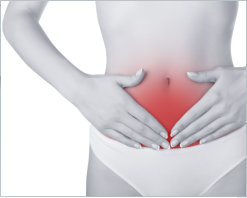Diarrhoea (also spelled “diarrhea”) is basically an increase in the regularity of bowel movements and/or a decrease in the form of
the stool (i.e. more “looseness” and water content). It is almost always a symptom of a separate health issue, infection or some
other external factor (such as stress or diet).
On average, healthy individuals have a maximum of three bowel motions every day. Therefore, “absolute diarrhoea” can be
described as any number of stools over and above three. On the other hand, “relative diarrhoea” is generating more bowel
movements than is usual for the specific person affected.
Types of diarrhoea
There are two main types of diarrhoea:
•
acute: which is short-term diarrhoea; and
•
chronic: where the diarrhoea lasts for a month or more. The phrase “chronic” is used to describe conditions that typically
worsen over time, come and go and persist for the long-term. Diarrhoea that holds up longer than four weeks can be
considered chronic.
The two tend to happen for different reasons, but both work the same way.
Many instances of diarrhoea will resolve on their own. However, in some cases, where the diarrhoea is chronic and therefore long-
lasting, it can lead to dehydration and/or be a sign of a more significant problem, which may require some form of action.
What can cause diarrhoea?
As everyone knows, having diarrhoea is not a pleasant experience. It can have any number of triggers, as (as mentioned above) it is
normally prompted by an external factor, such as another medical condition.
Stools are usually “looser”, regardless of whether regularity has increased. In the course of normal digestion, food is kept liquid by
the release of huge volumes of water by the gut (including the upper small intestine), pancreas and gallbladder. Food that's not
digested arrives at the lower small intestine and the colon in liquid form. The lower small intestine, and particularly the colon, take in
the water, converting the undigested material into a more-or-less solid stool form.
Greater levels of water in the stool (leading to diarrhoea) may be present for three main reasons:
1.
If the gut and/or small intestine secrete a high level of fluid
2.
If the distal small intestine and colon don't take in a sufficient amount of water
3.
If the undigested, liquid food progresses through the small intestine and colon too quickly for enough water to
be extracted.
Of course, one or more of these irregular actions may take place simultaneously, but what might cause them to occur?
Food intake or psychological upset (mild acute diarrhoea)
Attacks of mild acute diarrhoea are often linked to a straightforward dietary cause, for example eating a large quantity of rich foods
or by eating an over-abundance of roughage. Mental upset can also affect bowel motions.
This sort of diarrhoea is fairly prevalent, typically only lasts for one or two days and goes away by itself without treatment.
Infection (serious acute diarrhoea) and traveller’s diarrhoea
Serious acute diarrhoea could be caused by viral, bacterial or parasitic infection (including food poisoning, unsafe water and through
certain respiratory infections) and will most likely need action, primarily to avoid de-hydration and to address electrolyte imbalances
where the diarrhoea goes on for several days.
Many viruses, bacteria and parasites contribute to greater secretion of liquid, whether by entering and inflaming the cellular lining of
the small intestine (inflammatory reaction stimulates the lining to secrete fluid) or by manufacturing toxic compounds that also
stimulate the lining to release fluid, but without producing inflammation.
Inflammation of the small intestine and/or colon from bacteria or from ileitis/colitis can enhance the rapidity with which food stuff
moves through the intestines, reducing the period of time that is available for absorbing water.
Those who visit foreign (and particularly developing) countries are at risk of what is often referred to as “traveller’s diarrhoea”. This
is brought on by eating food or drinking water contaminated by bacteria, viruses or parasites.
Functional digestive disorders and inflammatory bowel diseases (IBDs)
Chronic diarrhoea is often connected to functional disorders, such as Irritable Bowel Syndrome (IBS) or inflammatory bowel disease
(IBD), such as Crohn’s disease and ulcerative colitis.
Potential treatments for diarrhoea
Re-hydration
In most cases, where only mild diarrhoea is experienced for a short period (i.e. 1 - 2 days), and where instances of diarrhoea of
rare, restoring lost water to avoid dehydration is likely to be the only treatment required.
Medicine and antibiotics
Drugs that stop diarrhoea could possibly be helpful in certain instances, but they're not normally suitable for those whose diarrhoea
comes from a bacterial infection or parasite. This is because halting the diarrhoea could possibly serve to “trap” the organism in the
intestines, thereby prolonging the problem.
Viral causes are usually either treated with medication or left to run their course, dependant upon the seriousness and type of bug.
In most cases, replenishing lost liquid to prevent dehydration is necessary.
It is also worth noting that diarrhoea can sometimes be caused by taking antibiotics that are taken for infections. These can often
have the unintentional consequence of altering the good bacteria (probiotics) living within your gastrointestinal system.
Once the delicate balance of good and bad bacteria has been disrupted, it can cause various other imbalances in the digestive
system, given enough time, and symptoms like diarrhoea may start to appear (or re-appear). In such cases, many individuals find it
helpful to supplement their diet with probiotic supplements, to help rebuild the balance of bacteria in the digestive tract.
*Always be sure to consult your physician or qualified health practitioner if you have concerns about diarrhoea (particularly if you
are pregnant, breastfeeding or on medications).
About diarrhoea
[Home] [Irritable Bowel Syndrome] [Diarrhoea] [Digestive Disorders] [Coeliac Disease] [Colon Cleansing] [Constipation] [Digestive Health] [Bowel Problems] [Bad breath] [Candida albicans]






Diarrhoea and other digestive health problems




